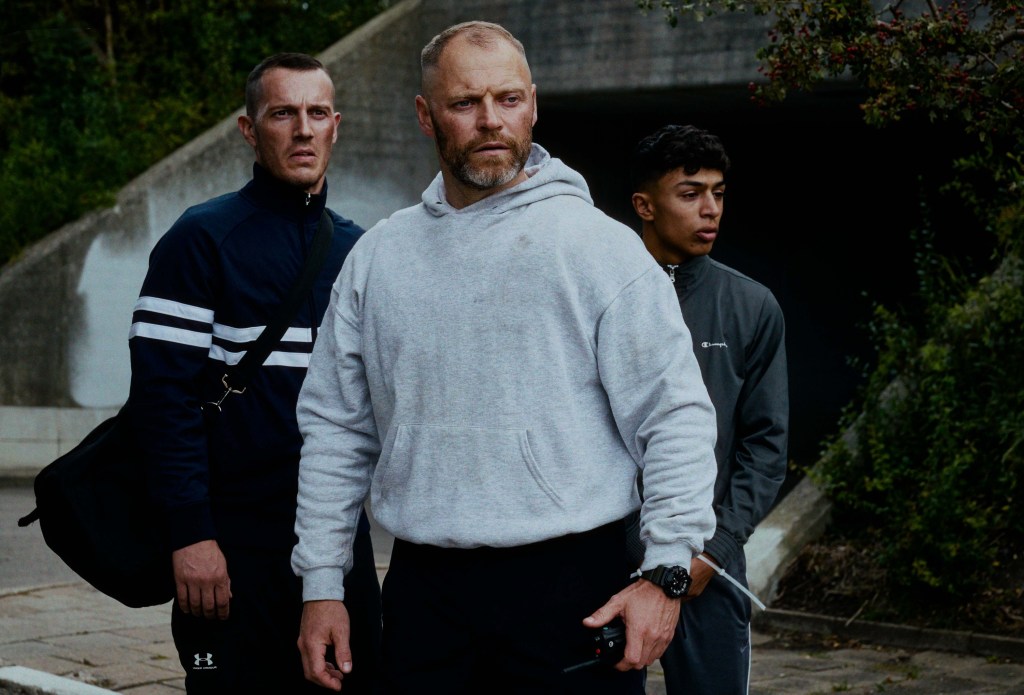Shorta – Film Review

The Danish word Shorta means enforcement and this film is certainly not short of drama. It is a gritty, gripping policier where loyalties are tested against a political backdrop and police brutality and corruption. It is difficult to know where localities lie as boundaries are crossed and moral compasses are placed to the limit in this riveting survival of the fittest.
Danish co-directors Anders Øholm and Frederik Louis Hviid have turned the tables on the usual dynamics where police brutality is a theme. There is an instance of heavy handed policing referenced within this Scandi-Noir film but the directors have chosen to place the specifics within the background. Instead, details of the incident are unveiled through news footage and off hand conversations as another example of police brutality. Interestingly, it is the aftermath and the question of trust that take precedence and are a more significant component within the film. It is a bold direction within this directorial debut from Oholm and Hviid particularly as the officers’ individual motivations are not fleshed out fully with merely a superficial insight provided. But, such approach compellingly draws out the suspense.
Still when Jens, Simon Sears, is paired with Mike, Jacob Lohmann, whose reputation precedes him for being biased and ‘old school’, there is a sense of déjà vu as the format is reminiscent of films such as Training Day, 21 Bridges and Sicario. The film’s direction conveys the ‘good cop, bad cop’ trope well. This is especially the case when Mike seems to believe that Jens will eventually become as jaded as him. Jens’ initial views appear to be more humane towards immigrants on the streets, where he will quite often turn a blind eye, but the film unfortunately chooses not to delve into those elements further and adopts the safer, predictable character arcs. Such decision is unsatisfying during key moments of the film.

Where Shorta excels is in its terse depiction of a battle of wits particularly when the predators become the prey in a literal war on the streets designed to achieve respect following an incident of police brutality that made headlines.
It is never clear as to Shorta’s position concerning the police and their narrow view as the film seems to advocate the police’s actions with slow motion shots akin to a music video. The close up images of the police car, the police symbol on the car and on their jackets almost seems like a police recruitment video and a bid to make them seem modern although hard hitting. It feels uncomfortable at times given the context and this attempt to humanise the police’s behaviour is misjudged despite being humorous.
However, the film successfully ratchets up the tension between the two officers given their diverse viewpoints which sharply cuts through the air as that dangling sword. Shorta’s political commentary narrowly saves it from being an extended episode of the TV show ‘Cops’ within the film’s leaning on stereotypes. Stereotypical phrases such as ‘all brown people support Arsenal’ are truly cringeworthy to emphasise the bias.
Overall, Shorta is a riveting and enjoyable film although it is weighed down by its limitations. It is a simple but effective premise as a cat and mouse game challenging the established rules of ‘honour’ and ‘duty’.

The chemistry between Sears and Lohmann will also pique the audience’s interest but unfortunately this pairing does not seem to escape from the mould established by historic policiers. But, there are plenty of explosives for the action film fans in this tale of the erosion of communities and that challenge to uphold a sense of duty as a police officer.
Shorta has impressive editing and is atmospheric enough to ensure that its audience’s attention will not wane as it a is thoroughly entertaining directorial debut.

